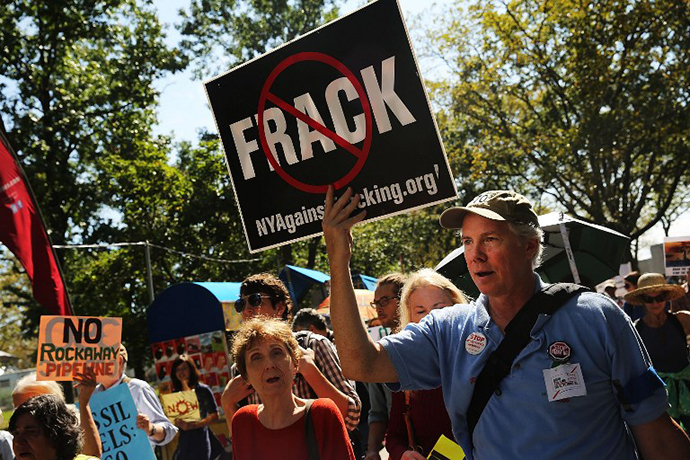Fracking nightmare: ‘Like living in a very heavy industrial zone’
Texan anti-fracking activist Sharon Wilson described to RT the consequences of fracking she had to face, including being forced to move home due to air pollution, a lack of clean water and toxic chemicals.
Wilson was forced to move out of her home, which was located on the Barnett Shale formation in Texas, because “it was like living on the edge of a volcano,” according to her blog. She became an activist to fight fracking and help others facing the same situation.
RT:You had to move house because of fracking in your neighborhood. What was the worst thing about it?
Sharon Wilson: It just totally changed the character of the country. I moved to the country because I wanted my children to grow up in peace and with clean air and clean water. At one time I turned my tap on and nothing came out, which was very frightening. The air was degraded horribly. Trucks, lights, noise – it completely changed the character. It was like living in a very heavy industrial zone.
RT:But what was so bad that you had to move?
SW: The worst concern to me was to end up without water or that my son could end up being sick from the chemicals that he was being exposed to.
RT:And of course, if you didn’t want to live there, it would be difficult to find other people who would.
SW: I lost about $80,000 in property value.
RT:What action are you now taking against fracking?
SW: For years I was a volunteer activist. And then, two years ago, Earthworks Oil and Gas Accountability Project hired me to be their Texas organizer. I stay very busy here. People contact me constantly with all sorts of problems they’re experiencing.
RT:France introduced a ban on fracking. What's stopping America from doing the same?
SW: There are a lot of local areas that have passed
banning resolutions all over the US. Pittsburgh was one of the
first. Just recently, four counties in Colorado passed bans. So,
it’s moving. It’s happening.

RT:Was your situation just one very sad, very sorry case, or were there a lot of people who suffered from fracking like you did?
SW: There are cases everywhere. One thing that you can depend on is that as they expand this practice – more and more people are harmed and more and more people join the opposition. Now there’s an entire neighborhood, over 500 homes, in Denton where they’re very, very close – 250 feet in some places – from peoples’ backyards.
RT:We’re talking about a series of earthquakes and tremors, which rocked Texas in the last few weeks. Have you felt them?
SW: I’m a little bit out of the current earthquake swarm. I’m out of that area now, but I’m in contact with the people who have experienced them. There have actually been two 3.6 [magnitude] earthquakes.
RT:Do you think it has something to do with fracking?
SW: Well, we’ve known since the 1960s that injection could induce earthquakes. So, that’s not new news. They’re trying to say that it’s only the injection of the waste that’s causing, but this past year there have been three earthquakes that happened during fracking. It’s getting harder and harder for the industry to say that it’s not due to fracking.
RT:The US economy still has strong demand for that fuel. Can you really expect corporations to pass up those profits?
SW: There are great profits also in renewable energy. I have solar panels on my house. Manufacturing the solar panels created a one-time impact, but now they’ll produce energy for 20 years, with no impact at all. So, I think that the renewable energy economy is taking over. And over 80 per cent of Americans want renewable energy.
The statements, views and opinions expressed in this column are solely those of the author and do not necessarily represent those of RT.












